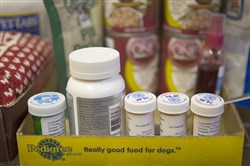VOL. 40 | NO. 40 | Friday, September 30, 2016
The cost of pet care
By Joe Morris

Robbin York, who helps foster dogs with Proverbs 12:10 Animal Rescue, has a shelf lined with medication for Wilene, a sick red healer mix.
-- Michelle Morrow | The LedgerOne major reason owners surrender pets is medical care.
Owning an animal can be expensive, especially as they age. But preventative care, such as regular vet visits and preventative care for heartworms and other common ailments can forestall many of those costs.
There’s much to be done around medical awareness, which could help more animals stay housed with their original owners, says Natalie Corwin, president and CEO at Pet Community Center, an animal welfare agency that operates a low-cost spay and neuter clinic in East Nashville.
“We are an animal welfare agency, and part of our focus on preventing pet homelessness is providing spay and neuter services to rescue agencies and the public,” Corwin explains. “We do surgeries between $30 and $61, and you don’t have to qualify or live in Davidson County to qualify for that price. We also have financial aid programs that discount the prices even further, or provide them for free, to people in ZIP codes with high rates of homelessness or breeds of animal that are at a high rate of risk, like cats and pit bulls, through our Pets for Life program.
“We also have our Community Cat program, where wild or feral cats can be humanely trapped and brought to us to be spayed and neutered. Our goal is to help reduce the number of pets that need help, or shelter.”
Access to resources would help the problem of owner surrender, Corwin says, and while her organization focuses on population control, there are other aspects to be considered as well.
“We know there’s a direct relation between spaying and neutering and the number of shelter animals, but we also know that people want to keep their pets and provide care but have obstacles like finding pet-friendly housing, or training to help reduce behaviors that leads to abandonment,” she says.
“People think that an owner is being willfully neglectful, but in fact they just don’t have the resources to go to the vet. They need access, and so we’re trying to plug in with what we do, as well as a wellness program that we’ve begun. We recognize that people are struggling and want to help them raise the standard of their pet care.”
Picking a vet
Even the well-run pet adoption can go off the rails if the new owners don’t secure proper veterinary care for their new dog or cat. Many adoptees are first-time owners, and rescues do a good job of making sure that they know about the importance of preventative care, says Dr. David Regan of 5 Points Animal Hospital.
“Adoption and rescue organizations are phenomenal; it takes special people to take an animal that nobody cares about and bring it into your home,” Regan says. “And a lot of them make sure they leave their care spayed or neutered, and with all the basic vaccinations on board. But you still need to establish a relationship with a primary veterinarian, because that animal’s going to get sick someday, and it needs regular, ongoing care.
“If it’s a first-time pet you’re going to have a lot of questions as time goes on, and it’s good to have someone to call.”
New pet owners should know that even the best rescue or adoption organization can’t afford to run all the tests an animal should have, such as those for GI parasites, and so a vet visit after taking ownership will just finalize all the good care that animal has received in its journey from abandonment to new home.
“When we recommend a fecal analysis just to make sure nothing’s snuck through, it’s not just about making sure the animal is healthy,” Regan says. “It’s also a public health issue. As a vet I can make sure that your new pet isn’t harboring something that could make you, or your other animals, sick. The rescues give great care, but there’s only so much they and the vets they work with can do because they are so busy.”
Continuing education on the importance of flea and tick, heartworm and other preventative medications is another aspect of what a primary-care vet offers, he adds.
“I love seeing a new pet owner come in with an animal that has been so well cared for and is so happy to be in its new home,” he says.